May 1999: North Korean Rural Energy Delegation Completes China Study Tour
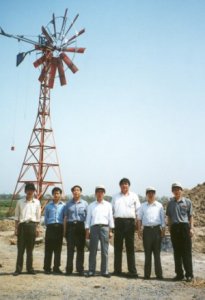 The Democratic People’s Republic of Korea (DPRK) Rural Energy Delegation, which recently visited the United States, has commenced the first study tour in China of rural energy issues and technologies. The study tour was completed in two parts: the Delegation visited China from April 14-16, 1999, and completed the second study tour in China between May 7-10, 1999, after returning from the United States. The study tour in China was coordinated by Professor Wang Yanjia, Director of the US/China Energy And Environment Technology Center (EETC)* at Tsinghua University in Beijing.
The Democratic People’s Republic of Korea (DPRK) Rural Energy Delegation, which recently visited the United States, has commenced the first study tour in China of rural energy issues and technologies. The study tour was completed in two parts: the Delegation visited China from April 14-16, 1999, and completed the second study tour in China between May 7-10, 1999, after returning from the United States. The study tour in China was coordinated by Professor Wang Yanjia, Director of the US/China Energy And Environment Technology Center (EETC)* at Tsinghua University in Beijing.
This cooperation, which involved the DPRK, China, and the United States, was very productive, and offers a good model for future work on energy issues in the DPRK by American non-governmental organizations.
The DPRK rural energy delegation spent several days meeting with Chinese energy experts and government officials, learning about China’s rural energy projects.
April 1999: North Korean Rural Energy Study Tour Leaves U.S. for China
A California think-tank has signed agreements with North Korean rural energy experts for a two-year collaboration to help solve critical energy problems in that country while building working relations with U.S. specialists.
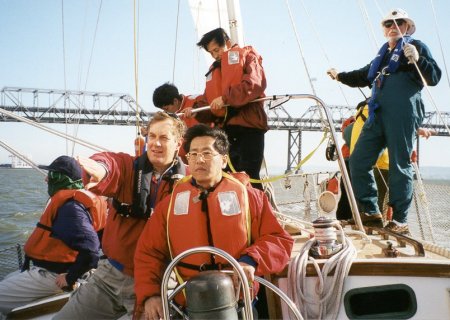
Peter Hayes, Nautilus Institute, points out San Francisco bay vistas to Li Ho Rim, DPRK Delegation Head.
Peter Hayes, Executive Director of the Berkeley-based Nautilus Institute, made the announcement after the five-member delegation from the Democratic People’s Republic of Korea (DPRK) departed May 4 from San Francisco for Beijing, China.
During the two-and-a-half-week visit, Dr. Hayes said, the Nautilus Institute signed an agreement with the North Korean delegation to continue the Institute’s ground-breaking collaboration over the coming two years on rural energy in the DPRK. The two sides agreed to work together on energy efficient water pumping for agriculture and human consumption in the DPRK.
Previously, the Nautilus Institute helped North Korean energy specialists build several windmills for power generation, supplying a health clinic, a kindergarten, and 20 homes in a rural village. The project was approved by the two countries’ governments as a humanitarian relief effort.
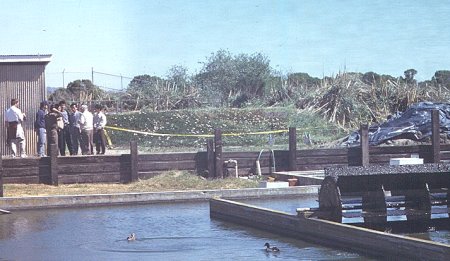
Dr. William Oswald explains using algae for biological wastewater treatment at the Richmond Field Station.
“After arriving on April 17, the DPRK rural energy delegation spent two weeks in California, Delaware, and Washington, DC and visited many public and private energy facilities,” Dr. Hayes said.
The visitors also went to U.S. Department of Energy* headquarters, where they were briefed on renewable energy technologies. In Delaware, the visitors spent a day on a rural electric cooperative, where they saw first-hand how electricity is distributed in rural areas of the United States.
In Berkeley, they also participated in a two-day workshop of scholars and experts on rural energy issues. The workshop was co-sponsored by Nautilus Institute, the Energy and Resources Group* at the University of California at Berkeley, and the Institute on Global Conflict and Cooperation* at the University of California at San Diego.
Precedent-Setting Visit
“This is the first time that North Korean energy experts and technicians have engaged in a forthright and open way in such scholarly exchange with American academics and experts,” said Dr. Hayes.
“The North Korean scholars came well prepared for this event, and provided substantial insights into the crucial links between food, fuel and famine in North Korea,” he added.
“It became starkly clear in our discussions that there can be no solution to the food problem in North Korea without provision of adequate energy for production, distribution and preparation of food,” he asserted.
U.S.-China-DPRK Cooperation
He stated that the US study tour was preceded and will be followed by a study tour on rural energy in China hosted by the Energy and Environmental Technology Center at Tsinghua University in Beijing.
“This three way non-governmental cooperation between the United States, China and the DPRK is very positive for improving the relations between countries in the region,” he said.
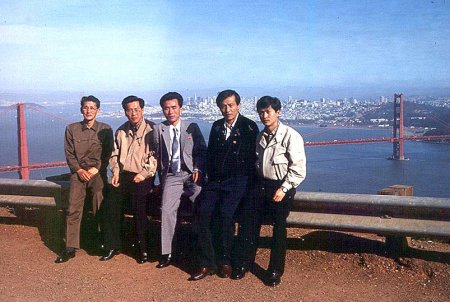
DPRK Energy Delegation tours the San Francisco Bay area:
Kim Ki Ok, Li Ho Rim, Kim Chang Il, Choe Song Chol, and Ri Kang Jin.
The private project, funded by the W. Alton Jones Foundation* in Virginia, is the first American non-governmental attempt to engage cooperatively with North Korea on energy and food production issues.
Nautilus has previously collaborated on two successful energy-related projects with North Korean NGOs. In December 1997, Nautilus sponsored the first energy study tour of the US by a DPRK delegation, focusing on renewable energy and energy efficiency. The tour visited a variety of manufacturers, national laboratories, electric utilities, NGOs, and government agencies, and included the first-ever DPRK visits to the headquarters of the Department of Energy and the World Bank.*
In 1998, a Nautilus team designed and built a wind power system in the North Korean village of Unhari, to provide electricity for humanitarian purposes such as clinic refrigeration and home lighting. This marked the first time that US and DPRK engineers have worked side-by-side in a field project of this kind.
December 1997: DPRK Renewable Energy Delegation Visits U.S.
A delegation of renewable energy specialists from the Democratic People’s Republic of Korea (DPRK) visited the United States from November 21 through December 6, 1997. The visit was hosted by the Nautilus Institute for Security and Sustainable Development, based in Berkeley, California.
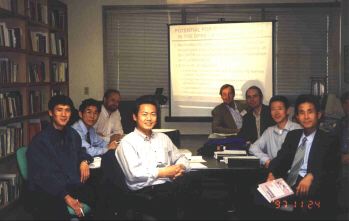
DPRK energy delegation at Nautilus Institute for briefing on “Potential for Energy Efficiency in the DPRK — A Rough Estimate.” From left: Choe Chol-Jung; Hwang Ha-Yong; Nautilus Associate Dr. David von Hippel, presenter; delegation leader Choi Chang-Hun; Nautilus Co-Executive Director Dr. Peter Hayes; Nautilus Associate Dr. Jim Williams; Jon Song-Myong; Mun Sok-bul.
The Delegation visited many renewable energy sites in the United States, including the Sacramento Utility Municipal District solar cell central station; the Zond Corporation wind farm in Tehachapi; the National Renewable Energy Laboratory in Colorado; and many other renewable energy firms.
Along the way, they received expert briefings on renewable energy and energy efficiency at Lawrence Berkeley Laboratory and from specialist renewable energy organizations including: the American Council for an Energy Efficient Economy; the International Institute for Energy Conservation; the Atlantic Council; the National Rural Electric Cooperative Association; and the National Wind Energy Association and the Solar Energy Industries Association.
The delegation also met with US Department of Energy officials in Washington DC, the first time that a DPRK delegation has visited DOE headquarters. They were also briefed at the World Bank on renewable energy international programs, the first ever visit by a DPRK delegation to the World Bank. The delegation was co-hosted by the Atlantic Council’s Conflict Resolution Program in Washington DC.
At the conclusion of the visit, the DPRK Renewable Energy Delegation and the Nautilus Institute agreed to establish in the DPRK in 1998 the US-DPRK Pilot Renewable Village Energy Project using small-scale US windpower turbines to meet humanitarian energy-related needs in rural end uses such as household lighting, medical clinic energy needs, agricultural water pumping, and food processing energy needs.

